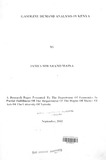| dc.description.abstract | Kenya is an oil importing developing country with rapidly increasing commercial energy consumption whereas the oil industry is a very important sector in the economy. The oil prices revolution has profound impact on the Kenyan economy. Severe effects are felt in form of inflation, unemployment and direct income losses resulting in large current account deficit. Petroleum is the second largest source of primary energy and the largest source of commercial energy for the modem sector in Kenyan economy. Light diesel oil is the most consumed petroleum product. Motor spirit is third after fuel oil. Thus demand for gasoline (motor spirit and light diesel oil) is, therefore, central to economic development. On the other hand, gasoline consumption has negative effects to the environment in form of vehicular emissions. This calls for further investigation on the determinants of gasoline demand and its impact on the environment.
The objective of this study is to analyze the factors that determine gasoline consumption in Kenya. It incorporates a more detailed analysis of the relationship that constitutes the demand for gasoline and the environment in Kenya and uses the results to make policy suggestions. The exercise is deemed necessary to provide important information to policy makers on the energy sector.
Ordinary Least Square estimation method is applied on a dynamic double-log model for motor spirit (regular and premium) and light diesel oil using annual countrywide data The parameters in the model are estimated using time series data and the co-integration approach is applied. The data was extracted from secondary sources in yearly series for the period 1963 to 2000. The results show that gasoline is significantly driven by income .
The income was found to be elastic. Other variables affect gasoline differently. The
policy recommendation based on the results of estimated model emerged that pricing policies should be accompanied by other policies to achieve the desired objectives. | en |

